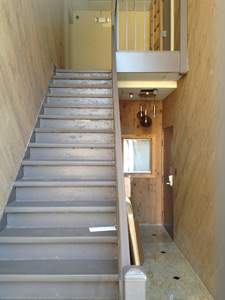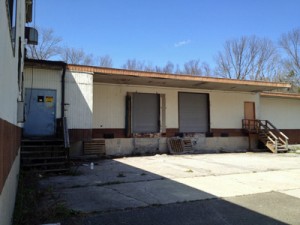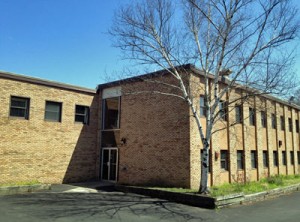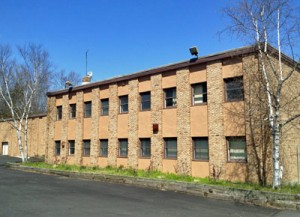The sturdy tan brick building at 100 Sterling Mine Road stands empty, or may be empty, depending on the accuracy of the building’s roadside signage. Built in 1970, the two-story office, with warehouse dock and bays in back, is the source of some controversy in Sloatsburg.
 Martin Lichtman, from Highland Mills, NY and listed owner of the property, which was purchased in either August of 2009 or 2010, has applied to the Village of Sloatsburg for a code use variance to convert the building into a food processing plant. Lichtman’s initial January 2012 handwritten use variance application lists the proposed project name as Guilt Free Gourmet, Inc., and requests “a use variance to allow for the preparation, processing and packaging of food products to be distributed.”
Martin Lichtman, from Highland Mills, NY and listed owner of the property, which was purchased in either August of 2009 or 2010, has applied to the Village of Sloatsburg for a code use variance to convert the building into a food processing plant. Lichtman’s initial January 2012 handwritten use variance application lists the proposed project name as Guilt Free Gourmet, Inc., and requests “a use variance to allow for the preparation, processing and packaging of food products to be distributed.”
 Sloatsburg’s Zoning Board of Appeals has set a public hearing on Lichtman’s petition for Thursday, April 19 at 7:30 in the Municipal Building.
Sloatsburg’s Zoning Board of Appeals has set a public hearing on Lichtman’s petition for Thursday, April 19 at 7:30 in the Municipal Building.
Zoning and land use rules can be murky. But this particular situation comes down to how the residents of Sloatsburg, through their elected officials, view land use in the village. Once a variance is given, a precedent is set that can create unintended consequences.
Lichtman submitted a narrative summary to Sloatsburg that sets forth his proposed reasons for a use variance that states he “has been unable to utilize the space for any manner since it was purchased.” As such, “the property cannot yield a reasonable return absent the variance.” Lichtman’s narrative summary says that the building layout itself has been an impediment to renting the space, calling the building’s interior layout a unique circumstance.
The use variance would have no effect on the building’s layout as no additional construction at the property has been proposed to date. The property was once home to Quality Carton, now of New Windsor, NY, and Anthony & Sylvan Pools.
An August 22, 2011 letter to Lichtman from Sloatsburg Building Department Inspector Ian Smith denies an apparent use variance request by the property owner, citing Local Laws established in 2007, Article VIII Supplementary Regulations 54-40 L. 2 (b), which prohibits in all Village districts the processing of foods set forth in Lichtman’s request. The subset of prohibitions reads as follows:
 (b) The cooking, distillation, processing and incineration of animal and vegetable products, including but not limited to brewery, distillery, food cannery plant, slaughterhouse, stockyards, fat rendering, soap manufacture, glue manufacture, tannery, paper manufacture, paint and varnish manufacture, creosote-products manufacture.
(b) The cooking, distillation, processing and incineration of animal and vegetable products, including but not limited to brewery, distillery, food cannery plant, slaughterhouse, stockyards, fat rendering, soap manufacture, glue manufacture, tannery, paper manufacture, paint and varnish manufacture, creosote-products manufacture.
In an April 5, 2012 letter to Lichtman, Rockland County Commissioner of Planning Thomas Vanderbeek cited General Municipal Law Review: Section 239 L and M, in denying a use variance for the property. Vanderbeek stated that the “department is not generally in favor of granting use variances because of the land use precedent that can be set. An applicant must prove unnecessary hardship.” Vanderbeek’s office stated that the applicant had not sufficiently demonstrated that unnecessary hardship exists.
 Vanderbeek’s office cited the Otto test, which refers to the 1939 land use case, Otto v. Steinhilber, that set land use variance precedents by ruling that the aggrieved party must demonstrate that zoning rules actually prevent a property owner from realizing a reasonable return or that the variance will not alter the essential character of the neighborhood and that the hardship is not self-created.
Vanderbeek’s office cited the Otto test, which refers to the 1939 land use case, Otto v. Steinhilber, that set land use variance precedents by ruling that the aggrieved party must demonstrate that zoning rules actually prevent a property owner from realizing a reasonable return or that the variance will not alter the essential character of the neighborhood and that the hardship is not self-created.
Vanderbeek’s office cited local law and referred the request back to the village level, stating that:
“If the Village believes that this is an appropriate use in a Industrial Park zone then the zoning ordinance should be amended accordingly. This is a more appropriate land use planning technique than the granting of use variances.”
Vanderbeek’s office also stated the the applicant’s tax lot identification number was incorrect.
So, the April 19 Sloatsburg Zoning Board of Appeals may determine, via local laws and use variance precedents, whether a food processing plant along Sterling Mine Road is in the best interest of the village.
100 Sterling Mine Road, and all properties along the north side of the road, are in close promixity to mapped federal wetland and partly within a state wetland. Any alterations to the property in question, may also require U.S. Army Corp of Engineers or Department of Environmental Conservation permitting for any construction on the site.
A Public Hearing on this matter by the Village of Sloatsburg Zoning Board of Appeals is set for Thursday, April 19 at 7:30 p.m. at the Sloatsburg Municipal Building. For additional information, call the Village Hall at 845-753-2727.
More At SloatsburgVillage
Brook Park Open For Play — Now freshly mulched, and with several stretches of new fencing, Brook Park is up and running for Sloatsburg residents.



